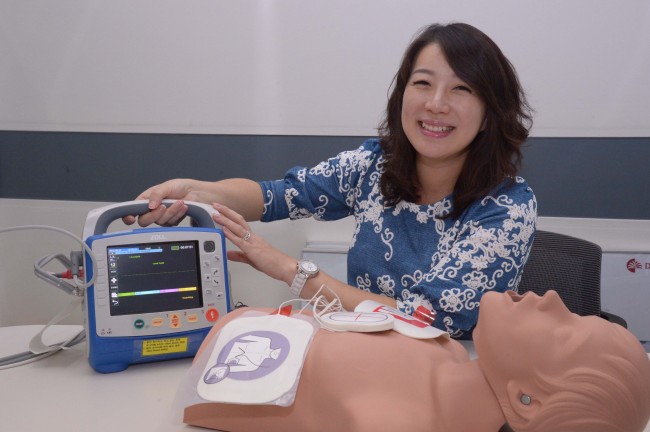[Herald Interview] Korea needs more advanced emergency medical devices: ZOLL
By 손지영Published : Oct. 5, 2015 - 16:43
In South Korea, where a growing number of hospitals and emergency medical staff are recognizing the need to implement higher quality CPR, the defibrillation business is geared for new growth and development in the years to come.
ZOLL Medical Corporation, a health care company under Asahi Kasei Group which develops and markets medical devices and software solutions that help emergency care, is eyeing Korea as a strategic market with great potential for business expansion, according to the firm’s local country manager Lee Mi-kyoung.
ZOLL Medical Corporation, a health care company under Asahi Kasei Group which develops and markets medical devices and software solutions that help emergency care, is eyeing Korea as a strategic market with great potential for business expansion, according to the firm’s local country manager Lee Mi-kyoung.

“Today, hospitals and particularly emergency medical service, or EMS, providers in Korea are purchasing more advanced defibrillators produced by firms like ZOLL and Philips Healthcare to increase the chances of saving more lives,” Lee said in an interview with The Korea Herald.
“We are closely watching Korea, as we perceive great potential to increase the nation’s in- and out-of-hospital cardiac arrest survival rates (by introducing and popularizing our high-end defibrillators and CPR devices here),” she said.
Though ZOLL Medical currently holds only a minor share of the country’s burgeoning defibrillator and AED market, the company is looking to expand its business in the years to come on the back of its sophisticated technology and a slowly-maturing medical industry.
ZOLL’s defibrillators and CPR devices, which are priced comparatively higher than competing products by rival health care device manufacturers such as Philips and Physio-Control, are considered among the most advanced in the industry.
A defibrillator is a medical device which administers an electric shock to the heart to restore its normal rhythm during a cardiac emergency. They are divided into two types -- automated models installed in public facilities for use by regular people and manual models used by professional medical staff at hospitals.
Moreover, the electric shock must be accompanied by proper cardiopulmonary resuscitation, or CPR -- regular pumping of the chest to keep blood flowing to the brain and other vital organs until a more definitive medical treatment can restore normal heart rhythm.
Differentiating themselves from competing products, all of ZOLL’s AEDs and defibrillators are equipped with a special CPR feedback tool that monitors the user’s movements and offers tailored feedback via audio and visual prompts to help the user carry out more optimal CPR.
“Today, Korean hospitals and EMS are reluctant to purchase more advanced defibrillators due to constrained budgets, though they recognize the importance of high quality CPR” said the ZOLL Medical executive.
“Yet, the CPR feedback has been proven to make a significant life-saving difference by increasing the patient’s chances of survival,” she said, adding that “even the most experienced doctors can increase their CPR success under precise guidance.”
Another one of ZOLL’s flagship devices is its noninvasive cardiac support pump, geared for use by hospitals and the EMS sector. It automatically delivers CPR to the patient, and is able to move more blood more consistently than is possible with manual compressions carried out manually by humans.
“Though doctors recognize the benefits of CPR delivered with consistent strength and pace, most Korean hospitals shy away from purchasing such advanced, automated equipment, because they can save money by simply make the resident intern do manual CPR,” Lee said.
“This is slowly changing though, as more medical staff are recognizing the need to implement more advanced CPR and defibrillators in carrying out their medical services,” she said.
In a bid to help doctors experience the difference with their own eyes, ZOLL regularly carries out a workshop called “CPR Challenge” for doctors, during which they carry out CPR with and without the device’s guidance and compare the difference.
“Once the doctors see for themselves, they recognize the superior benefits of CPR monitoring and guidance,” she said.
Meanwhile, ZOLL Medical, which boasts the No. 1 market share in the North American defibrillator market, is seeking to introduce a wider range of its life-saving medical devices to Korea in the near future, including its flagship Life Vest, a wearable defibrillator worn by patients at risk of sudden cardiac arrest, among others.
“Though ZOLL is currently a step behind in Korea compared to its position in other regions, we will continue to work to expand our products and services here as a company with great potential,” said the ZOLL Medical Korean chief.
By Sohn Ji-young (jys@heraldcorp.com)








![[KH Explains] Hyundai's full hybrid edge to pay off amid slow transition to pure EVs](http://res.heraldm.com/phpwas/restmb_idxmake.php?idx=644&simg=/content/image/2024/04/18/20240418050645_0.jpg&u=20240419100350)






![[From the Scene] Monks, Buddhists hail return of remains of Buddhas](http://res.heraldm.com/phpwas/restmb_idxmake.php?idx=652&simg=/content/image/2024/04/19/20240419050617_0.jpg&u=20240419175937)

![[KH Explains] Hyundai's full hybrid edge to pay off amid slow transition to pure EVs](http://res.heraldm.com/phpwas/restmb_idxmake.php?idx=652&simg=/content/image/2024/04/18/20240418050645_0.jpg&u=20240419100350)

![[Today’s K-pop] Illit drops debut single remix](http://res.heraldm.com/phpwas/restmb_idxmake.php?idx=642&simg=/content/image/2024/04/19/20240419050612_0.jpg&u=)